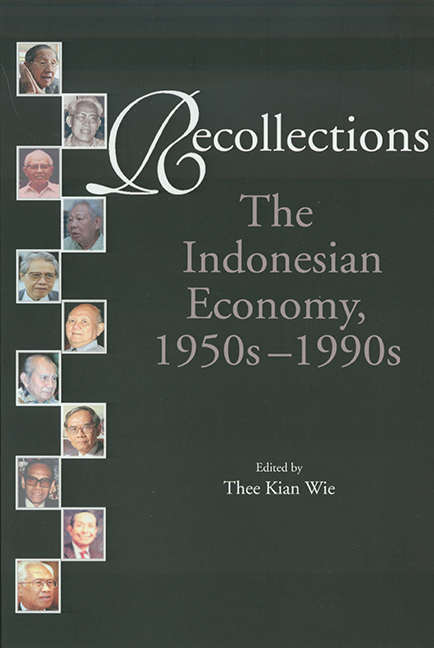Book contents
- Frontmatter
- Dedication
- Contents
- Foreword
- Preface
- Acknowledgments
- Introduction
- II Recollections
- 1 Sumitro Djojohadikusumo
- 2 Mohammad Saubari
- 3 Sjafruddin Prawiranegara
- 4 Abdoel Raoef Soehoed
- 5 Sarbini Sumawinata
- 6 Mohammad Sadli
- 7 Soedarpo Sastrosatomo
- 8 Suhadi Mangkusuwondo
- 9 Emil Salim
- 10 Subroto
- 11 Teuku Mohamad Daud
- Index
- About the Editor
2 - Mohammad Saubari
from II - Recollections
Published online by Cambridge University Press: 21 October 2015
- Frontmatter
- Dedication
- Contents
- Foreword
- Preface
- Acknowledgments
- Introduction
- II Recollections
- 1 Sumitro Djojohadikusumo
- 2 Mohammad Saubari
- 3 Sjafruddin Prawiranegara
- 4 Abdoel Raoef Soehoed
- 5 Sarbini Sumawinata
- 6 Mohammad Sadli
- 7 Soedarpo Sastrosatomo
- 8 Suhadi Mangkusuwondo
- 9 Emil Salim
- 10 Subroto
- 11 Teuku Mohamad Daud
- Index
- About the Editor
Summary
There are two events in particular on which I would like to comment, which were raised in the interview with Professor Sumitro, and in both of which I was personally involved. The first concerns the issue of new money by the government of the Republic of Indonesia (Oeang Republic Indonesia, ORI) in the months immediately following the proclamation of independence. Immediately after Proklamasi (the proclamation of Indonesia's independence), one of the most pressing problems confronting the Republican government was that of finding the means to finance both the struggle with the Dutch, and other diplomatic activities essential to its international recognition. It was Sjafruddin Prawiranegara, who at that time was still in charge of the taxation office in Bandung, who persuaded Bung Hatta of the need to issue new money, both as a means of financing essential government activities and of showing the world that the newly proclaimed government was indeed running the country. At the beginning of 1945 there were two currencies still in circulation; the old Netherlands-Indies money and that issued by the Japanese. When the Dutch returned with the allied forces in September they began to issue new money of their own, although in the first few months they used the Japanese money for most of their transactions. The result of this was that the volume of money in circulation rose rapidly in late 1945 and early 1946, with rising inflation an inevitable consequence, given the acute shortage of most basic goods and services. Vice President Hatta decided that the Republican government would issue currency notes in place of those issued by the Japanese, while those issued by the Dutch would not be considered legal tender in the areas controlled by the Republican forces.
The problems of printing money in Java in late 1945 and 1946 were considerable. The two establishments which appeared to be most suitable were the printing firm of G. Kolff in Jakarta, which had printed banknotes for the Japanese and which in 1945 was under trade union control, and sympathetic to the Republican cause, and another Dutch printing establishment near Malang.
- Type
- Chapter
- Information
- RecollectionsThe Indonesian Economy, 1950s–1990s, pp. 67 - 74Publisher: ISEAS–Yusof Ishak InstitutePrint publication year: 2003



